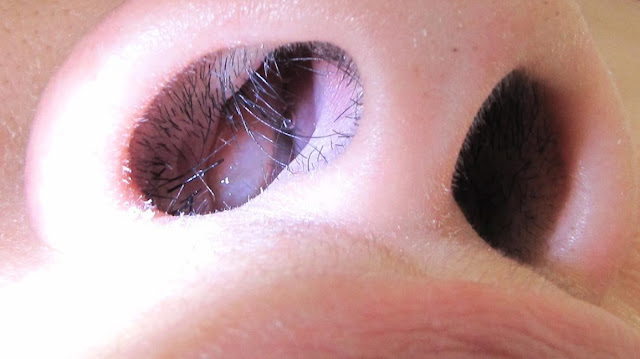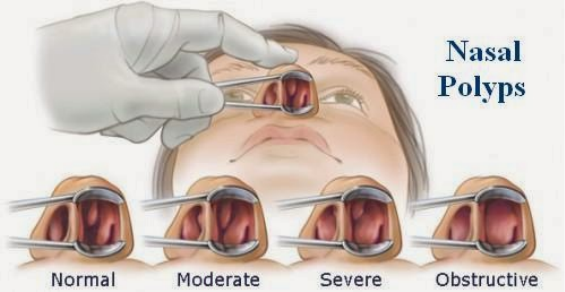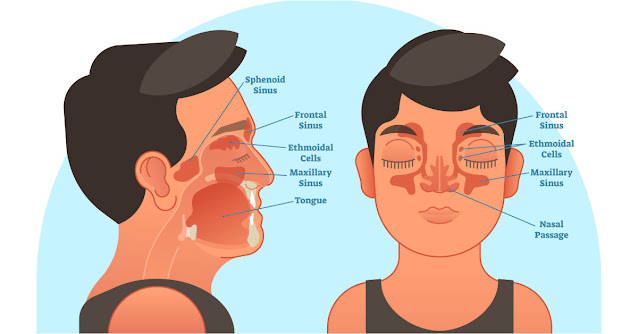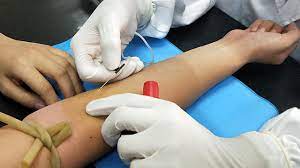In this article we will discuss about
1- POLYPUS DEF:
2- SYMPTOMS
3- REASONS
4- ITS DANGEROUS
5- UNTREATED NASAL POLYPUS
6- SURGERY TREATMENT
7- DIAGNOSIS
8- TREATMENT BY ALLOPATHY
9- TREATMENT BY HOMOEOPATHY
NASAL POLYPUS DEFINITION:
Nasal polyps are smooth, painless, cancer-free growths on your nasal passages or lining of the sinuses. They hang like teardrops or grapes. They are caused by chronic inflammation and are associated with asthma, recurrent infections, allergies, drug sensitivities or certain immune disorders.
Minor nasal polyps may not cause symptoms. Large growths or clusters of nasal polyps can block your nasal passages or cause breathing problems, loss of sense of smell and frequent infections.
SYMPTOMS OF NASAL POLYPUS:
Nasal polyps are associated with irritation and swelling of the lining of your nasal passages and lining of the bones lasting more than 12 weeks (chronic sinusitis).
However, it is possible to have chronic sinusitis without nasal polyps.
Nozzles are polyps so if they are small, you may not know about them, they are soft and do not cause sensation. In multiple aging or a large polyp can block your nasal passage and bone pores.
Common signs and symptoms of chronic sinusitis with nasal polyps:
1-Snot nose / runny nose
2- Constant humidity
3- Post nasal drip
4- Decreased or no odor
5- Loss of sense of taste
6- Pain or headache
7- Pain in your upper toothache
8- Feel the pressure on your forehead and face
9- Snoring
10- Frequent bleeding from the nose
REASONS OF NASAL POLYPUS:
Nasal polyps grow in the inflamed tissue of the nasal mucosa. Mucus is a very wet layer that helps protect the inside of your nose and sinuses and moisturizes the air you breathe. During an infection or allergy-induced irritation, the nasal mucosa becomes swollen and red and produces fluid that comes out of it. With prolonged irritation, the mucus forms a polyp. A polyp is a rounded growth (like a small cyst) that can block the nasal passages.
Although some people are able to develop polyps without any pre-existing nasal problems, there is often a trigger for polyps to develop. These triggers include:
Chronic or recurrent sinus infections
1- Asthma
2- Allergic rhinitis (hay fever)
3- Cystic fibrosis
4- Churg-Strauss syndrome
5- Sensitivity to non-steroidal anti-inflammatory drugs (NSAIDs) such as ibuprofen or aspirin
6- Some people may have a hereditary predisposition to develop polyps. This may be due to the way their genes cause their mucus to respond to inflammation.
ARE NASAL POLYPUS DANGEROUS?
There is no evidence that nasal polyps are malignant. However, they can cause great discomfort and can interfere with the normal drainage and ventilation of your sinuses. The mucus produced by the sinuses is intended to remove irritation and contaminants from the nasal passages. If the nasal polyps are too large, they can block the normal flow of mucus and cause it to form and infect, which can exacerbate your sinus problems.
What Happens If Nasal Polyps Are Not Treated?
Nasal polyps are usually tear-drop-sized benign growths in the nasal area or in the mucous membrane of the nose. It's like a nosebleed the way you feel during a cold or flu. But the jam situation continues due to the jam. They are inflamed and non-cancerous. Nasal polyps can start for a variety of reasons. If your cold is never over and you experience nasal congestion, visit a nasal polyps specialist for treatment.
Nasal polyps are a condition commonly associated with chronic rhinosinusitis. The mucous membrane in the nasal area helps to keep the air you breathe free of foreign particles. So when you suffer from flu or cold you experience runny nose, which is usually due to inflammation of the mucous membrane. When the swelling lasts more than 12 weeks, it can lead to the development of nasal polyps.
Women are less likely than men to suffer from this disorder. These are most common in people over 40 years of age. Children under the age of 10 are less likely to be infected. If you notice any abnormal growth in the sinus area, consult a sinus doctor for further diagnosis.
It also affects people who have no previous history of nasal problems. Some other conditions that can trigger the development are sinusitis, asthma, aspirin sensitivity, hay fever, and cystic fibrosis.
People often dismiss nasal polyps as pus or a common infection. If left untreated these nasal polyps can develop into serious health conditions such as obstructive sleep apnea, asthma fly-ups and sinus infections.
1- Obstructive Sleep Apnea:
A condition in which the flow of oxygen during sleep stops at various intervals. The period when oxygen flow stops is called apnea or apnea episode. If left untreated with OSA it can lead to health problems like ******, high blood pressure and diabetes.
2- Asthma Inflammation-ups:
Asthma inflammation is commonly referred to as an asthma attack or exacerbation. It occurs when the asthma condition worsens and also occurs when asthma is controlled. You may experience severe shortness of breath and fatigue.
3- Sinus Infection:
Sinusitis is an infection usually caused by swelling, inflammation of the mucous membranes along the way. The sinus is the space between the eyes and behind your cheekbones. This space is responsible for the secretion of mucus to keep the lining moist. In severe sinus conditions the face may feel swollen and swollen.
Visit your nearest Nasal Polyps Hospital in Coimbatore to prevent further complications and get immediate help.
4- Nasal Polyps Are Usually Not Fatal:
but if left untreated they can trigger many health problems that can seriously harm your body. It is always advisable to consult a nasal polyps specialist for further diagnosis and treatment.
It can be benign, inflamed tissue that can cause problems in your daily life. Make sure the sinus, flu or cold is treated immediately to prevent the growth of polyps.
Consult your doctor if you develop polyps and have proper nasal polyps treatment to prevent further complications. Ignoring any abnormalities can lead to serious problems. It is widely said that healing is better than cure.
Nasal Surgery / PolyPus Surgery:
Polyps are cancer-free (benign) growths that resemble a bunch of grapes. They are located in your sinuses, in front of your nose or even further back.
Nasal polyps can cause symptoms that affect your quality of life, including:
1- Loss of smell
2- Nasal pressure
3-Congestion
4- Sinus infection
Surgery is usually considered if other treatments do not alleviate these symptoms.
Surgery to remove nasal polyps is called nasal polypectomy.
This is not appropriate if you are a smoker or have a history of conditions such as bleeding concerns or severe pulmonary or cardiac problems. Health care professionals can recommend whether a polypectomy is right for you.
And while your symptoms improve dramatically, polyps often grow slowly.
How It Works?
Nasal polyp surgery removes polyps from the lining of your nasal and sinus areas. The procedure you need depends on where the polyps are.
For large polyps on the front of your nose, the doctor may remove them in the office using a device called a microdebrader. It lifts (removes tissue) and absorbs loose material at the same time.
Alternatively, your doctor may remove the polyps using small graspers. This procedure is called an intranasal polypectomy.
For polyps that are very small in size, more extensive, deeper in your nasal cavity or complicated in other ways, you may need a nasal polypectomy in the operating room under anesthesia.
For this minimally invasive surgery, your doctor will use an endoscope, a small tube with a light and a camera at the end. With an endoscope, your doctor will identify the polyps and remove them using small instruments.
How Long Does It Take?
Nasal polyp surgery usually lasts a few hours. If you are under general anesthesia, you may spend days preparing for surgery and recovering from the surgery.
In most cases, you can go home the same day you had your surgery. Some people may need to stay in the hospital overnight.
Make sure you arrange for someone to be with you at night to help you get home and monitor your condition.
DIAGNOSIS:
Your doctor can usually make a diagnosis based on your answers to questions about your symptoms, a general physical exam and an examination of your nose. Polyps may be visible with the aid of a simple lighted instrument.
Other diagnostic tests include:
1- Nasal Endoscopy:
A narrow tube with a lighted magnifying lens or tiny camera (nasal endoscope) enables your doctor to perform a detailed examination inside your nose and sinuses.
2- Imaging Studies:
Images obtained with computerized tomography (CT) can help your doctor pinpoint the size and location of polyps in deeper areas of your sinuses and evaluate the extent of swelling and irritation (inflammation).
These studies may also help your doctor rule out other possible blockages in your nasal cavity, such as structural abnormalities or another type of cancerous or noncancerous growth.
3- Allergy Tests:
Your doctor may suggest skin tests to determine if allergies are contributing to chronic inflammation. With a skin prick test, tiny drops of allergy-causing agents (allergens) are pricked into the skin of your forearm or upper back. Your doctor or nurse then observes your skin for signs of allergic reactions.
If a skin test can't be performed, your doctor may order a blood test that screens for specific antibodies to various allergens.
4- Test For Cystic Fibrosis:
If you have a child diagnosed with nasal polyps, your doctor may suggest testing for cystic fibrosis, an inherited condition affecting the glands that produce mucus, tears, sweat, saliva and digestive juices.
The standard diagnostic test for cystic fibrosis is a noninvasive sweat test, which determines whether your child's perspiration is saltier than most people's sweat is.
5- Blood Test:
Your doctor may test your blood for low levels of vitamin D, which are associated with nasal polyps.
HOMOEOPATHY TREATMENT FOR NASAL:
Homeopathic treatment for sinusitis has a good range of treatments for both acute and chronic sinusitis if treated constitutionally and medically. Medical treatment method gives the best results in relieving severe symptoms like nasal congestion, headache, fever, dense discharge from the nose.
Constitutional treatment helps to completely cure a chronic case by modifying the hypersensitivity of the immune system. Different ways. The allergen causes an allergic reaction and leads to inflammation of the sinuses.
Below are some common medications prescribed for sinusitis.
Common Remedies For Close or Closed Nose :
1- Kali Bichromium:
Obstructed tight nasal discharge in the nose. Pain at the base of the nose.
2- Arum Triflinum :
Nasal congestion despite a thin discharge from the nose. It is associated with laryngitis, which is a sore throat with pain when speaking. The desire to lift the patient's nose makes him uncomfortable.
3- Hepersulf :
Nasal congestion due to exposure to dry cold air. Nasal congestion causes coughing, which is worse in the morning and evening
4- Sticta:
Nasal congestion with drying of the mucous membrane of the nose. The patient always wants from the nose but no discharge.
5- Amon Carb:
Usually nocturnal nasal congestion, can not breathe comfortably due to the feeling of being closed at night. To clear the nose, the patient always keeps some medication with him.
For Thick Nasal Discharge
1- Kali Bichromium
It is given in the case of dense, tight secretions from the nose. The patient has pain in some areas of the front of the head that point with the tips of the fingers. If the water coming out of the nose is tested using any medicine or heat, then there is pain at the base of the nose. Mostly used for PND (post nasal drip) with thick nasal discharge.
2- Hydrastis:
Thick, yellow, tight neoplasm discharge from the back of the throat. Mostly used for PND (post nasal drip) with thick nasal discharge. Differential diagnosis of both drugs - there is a more tight-like discharge into the cervix, while the hydrocephalus has a thicker discharge. Pain in coli B is indicated by the patient's fingers, but it does not occur in hydrocephalus.
3- Pulsatilla:
Pulsatilla also has thick, yellow, green nasal secretions. But is more favorable and aggressive to green discharge. The discharge is light, which means it does not burn and is completely relieved in the open.
4-Merc Sol:
There is also the feature of a thick discharge from the nose. Here in this case the discharge from the nose is yellow-green and of a pungent nature, i.e. with a burning sensation. The inner nasal mucosa is scarred and ulcerated due to a thick intense discharge. Another important feature of Merck Sol is the association of excess saliva with all diseases.
Prevention Of Sinusitis:
Prevention is always better than cure. Consider these basic tips to reduce the chances of developing a sinusitis condition.
Try to control your allergic condition. Consult your doctor and go for regular check-ups to prevent the development of allergies.
Try to stay away from common respiratory infections. Avoid crowded places and consider washing your hands at regular intervals, especially after using the toilet and before eating.
Use a humidifier in case of dry air in your home. Make sure the humidifier is clean and free of mold. Consider cleaning occasionally.
Take care not to be exposed to pollutants and cigarette smoke. These things can cause irritation and inflammation in the nasal passages, including your lungs.
Always use medicines after doctor advise.
Four more detail visit my channel
DR.TAYYIBA AJ
:















0 Comments